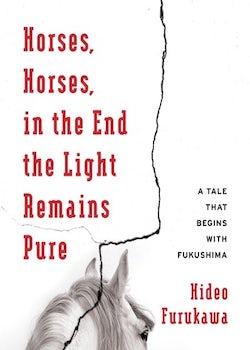Horses, Horses, in the End the Light Remains Pure

By Furukawa Hideo
Columbia University Press, 2016
ISBN-13: 978-0231178693
Review by Alice French
In declaring Horses, Horses, in the End the Light Remains Pure to be ‘a tale that begins with Fukushima’, Furukawa Hideo sets himself a mammoth task. How to do such a defining event in modern Japanese history justice in just 140 pages? Furukawa certainly seems aware of the enormity of the challenge, and remains until the end torn between tackling it with fact or with fiction. Whether the responsibility is a privilege or a burden, the multi-prize winning author does not take it lightly, putting, as he writes, his ‘integrity’ on the line in this attempt to provide some sort of closure (‘definitive salvation’ in the book) not only for himself (he was born in Fukushima) but also for an entire nation in mourning and to keep the disaster alive in people’s memories.
Horses, Horses was first published in the Shinchō journal in July 2011, and therefore can be read as an almost immediate autobiographical response to the 3.11 tragedy. As a Fukushima native whose farming family were in the Tōhoku region at the time of the earthquake and subsequent tsunami, the disaster had a personal as well as national significance for Furukawa. He was on business in Tokyo at the time and so could only watch events unfold from afar along with the rest of the population, distancing him from the reality of the destruction. This part-novel, part-essay follows his trip to the disaster zone and provides a ‘real-time’ account of his reaction to the devastation. In an attempt to express the inexpressible, Furukawa defines this period as ‘spirited away time’, conveying his struggle with the overwhelming mixture of emotions through his jumps between past and present, fact and fiction and first and third person. There is no doubt that his writing style is difficult to follow at first, in fact it remains perplexing until the final line, however in time it reveals itself to be nothing short of brilliant.
Furukawa is known for playing with genre in his novels, however Horses, Horses does not read as though it is deliberately experimental; rather it unfolds as a natural train of thought. Furukawa interrupts himself with memories and side notes and gets distracted from the main narrative by an apparent urge to put everything into wider historical perspective. As a result, the novel is studded with discerning and very quotable, if sweeping, lines such as ‘our history, the history of the Japanese, is nothing more than a history of killing people.’ At the risk of sounding clichéd, Furukawa truly does give his reader a glimpse into the inner workings of his thoughts as he attempts to come to terms with the obliteration of his hometown. With wonderful irony, the confusing narrative makes the narrator’s cocktail of emotions (guilt, grief, disbelief) crystal clear. At times, Furukawa is reluctant to address the issue of 3.11 directly, focusing on the effects it has had on the region’s wildlife rather than discussing the human impact. He even resorts to writing about the writing of novels in order to avoid the task of writing a novel about Fukushima. The text is full of such riddles and nods to metafiction, the elegance and eloquence of which must partly be attributed to Doug Slaymaker’s translation.
Overall, Horses, Horses, in the end the Light Remains Pure is an emotional, historical and, above all, literary triumph that really must be experienced first-hand. Although Furukawa himself recognises his inability to provide any sense of closure for the victims of 3.11 (he admits in the last line that ‘at this point my essay ends, and begins’), his prose should not be viewed as anything less than a masterpiece. In fact, it would not be hyperbolic to say that, in these 140 pages, Furukawa is able to convey comprehensibly the immediate emotional reaction of Japan just weeks after it experienced the most powerful earthquake in the nation’s history. Therefore, if you have the patience for the rather jumbled narrative, this is an absolute must-read.

